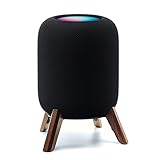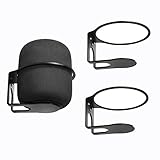STEREO GUIDE verdict
+ perfectly integrated into the Apple world
+ room corrections works automatically
+ Gen 2 sound more refined with well-integrated bass
- Difficult to communicate outside the Apple world
- to experience imaging you need 2 of them
-
Sound: tonal balance / transparency8.2
-
Sound: Bass / Dynamics8.5
-
Sound: spatial imaging8.2
-
Ease-of-use / Connectivity9.3
-
Price / Performance8.6
Apple can’t let go of the idea that are they designing not only greatest computers, tablets and phones but best sounding speakers in-house as well. Or is there a secret plan behind it to take over the world of electronics completely? Anyways, the second generation of the HomePod is finally here. The pricepoint has not changed from the predecessor, which was discontinued in 2021. We are talking about 350 bucks and pretty monaural reproduction. So to really experience sonic fascination, a true Appleficionado would be willing to invest into a stereo pair – a whopping 700 bucks would be deduced from your credit card.
Judging from the exterior, we would not be able to identify dramatic changes. Shape and dimensions being identical, a coloured display for setup and operation has been added. And yet there are small revolutions. For example, model one came had the mains cable attached. Now we are free to choose a longer or shorter external wire. A smart decision by Apple but certainly no revolution.
In addition, the device base has been redesigned. Some defeating feedback to the first version was a tendency to induce booming or rattling on certain types of desks or shelves at high SPL. That´s history, HomePod No. 2 offering signicantly improved traction.
Apple HomePod 2: add some inner value!
Far more exciting, however, is what Apple has changed inside. We found a surprising seven tweeters forming a 360-deg-array, which has been cut to just five in Model No. 2. The number of mics has also been reduced from six to four. This may sound like cost-cutting measures. But they aren´t thanks to a much more powerful CPU, the S7. It is in the latest HomePod as well in the latest Apple Watch.
Let’s try to imagine an X-ray and how it works inside. Okay, no one would dare to have a similar concept when it comes to classic hi-fi speakers. The Apple HomePod 2´s bass driver is positioned as the highest one just below the display in some kind of upfire arrangement. In the lower section we have five tweeters all around. Why that many? Because the circuitry is smart – with the help of the internal mics it is capable of analyzing your listening room´s acoustic pretty accurately. As a proud owner, I don’t have to do anything to that, the built-in, pretty powerful software does the job. So bloated bass or booming are avoided as well as two HomePods forming a stereo imaging automatically.




Apple & Mac Members only
Setting up the whole arrangement takes literally a minute. An iPhone is mandatory; HomePod 2 is taking over Wi-Fi settings from it. The iPhone is also needed when forming a stereo pair from two HomePods 2. Or when several rooms come into play to form a multiroom experience. That´s really smooth and does not cause any headache if you follow one important mantra: As PC or Android user, I am only an uninvited guest.
Two new features recently being unlocked via software update for the small HomePod Minis should not be left unmentioned: The current pods have a sensor for temperature and humidity built-in. What’s something like that doing in a speaker? Good question, but it is all about Apple integrating everything necessary for smart home scenarios. For example, HomePod is enables to automatically lower the blinds when the temperature gets too high, or turn up the heat when the snowflakes start appearing.
One more Thing
Another detail that might cause an impetus to buying the latest model: HomePod is sensitive to the sounds of smoke or carbon monoxide detectors. Whenever such a warning is noticed by an Apple device, you get a notification sent to iPhone or Apple watch.
One more thing: If you own a unit of HomePod series one, and now are thinking about expanding to stereo – you are wrong. It would not make any sense in terms of sound quality, and it is not possible anyways.
Which scenarios of listening to music might come to our mind? You might want to place one HomePod into your kitchen, a second in my bathroom, a third to the library. Okay, multi-room audio is neither rocket science nor unknown to other companies. And in this space race Apple is competing with players like Amazon offering significantly cheaper solutions and Bluesound striving for audiophile sound quality. So how to really get a state-of-the-art experience from an Apple installation? An Apple TV as the heart of the system is a good idea. You get a minialistic approach, maximum 4K picture quality plus stereo imaging thank to two HomePods 2.
Does the sound quality deserve appraisal as well?
Simply put: It sounds great. Apple has somehow changed the HomePod´s voicing towards balanced tuning and audiophile values. Version one might have sound pretty American to many. Pretty punchy but voluminous if not overly fat bass. The latest Apple HomePods 2nd generation sounds much more linear and homogeneous. It is a pretty smart device, you know about the CPU and plenty of software features, but you do not hear them. Should I buy a soundbar for 1000 bucks, or rather two HomePods? Fast answer: For an Apple user, the pods are clearly the better choice. The change to the new generation is clear. Everything seems more linear, more thought of.
Apple afficionados might recommend a single HomePod, but we would not proclaim that as a reference in terms of sound quality. Two Homepods are far better, justifying even a doubled budget. For some folks that might sound like high-end already, home theater fans in particular asking for some added value as they can get kind of 5.1 arrangements already. So be assured that the new HomePods are capable of handling all sorts of new formats including immersive audio. You need a proper source for that. Here, Apple´s packacking strategy comes into play: if one buys a Homepod he or she gets an Apple Music subscription for six months on top. Simple calculation: if you buy two pods, you can enjoy a whopping hundred million tracks into your room for a whole year.
Android users left out in the cold
But, once again, this magic only works in Apple´s own world. Those who prefer Android or Windows can take a leaf out of the book, but never enjoy the real advantages.
What´s the next step in terms of sound quality? The bass is fun, tight and well-integrated, but at some point we might want a custom-fit subwoofer from Apple. This certainly might change the game in terms of home cinema and TV sound. We assume Apple cannot let go of the idea that they build the best speakers in-house for their own big Apple world so why not a subwoofer?
Conclusion Apple HomePod 2
Same procedure as every year: As usual, it is difficult to take a rational view on whether to opt for an Apple product or an alternative. After all, if you’ve read this far, you’re likely to be a part of Apple´s universe like our author Andreas Günther. And in this case the second generation of the HomePod is basically without a serious alternative.
One more thing: for all those consider buying one. Get your bucks together and follow our ´Take two´ strategy as true stereo is a game changer from just having music around to really enjoying music. Our final rating of 86% was achieved by a pair of HomePods 2 and as we are STEREO GUIDE we refrain from having a verdict for a single unit.
Technical data Apple HomePod Gen. 2
- Retail price: 700 dollars/pounds/euros per pair (highly recommended), 350 per unit
- Dimensions (diameter x height): 14.2 x 16.8 cm
- Connectivity: WiFi, Bluetooth 5.0
- Features: 3D audio, room sensors, smart home hub, multi-room, stereo pairing, voice control via Siri
- More at: https://www.apple.com/








